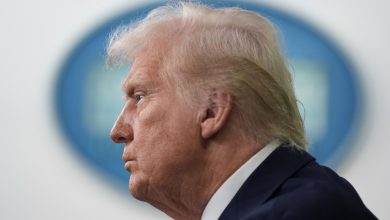House Republicans face headwinds as they seek to pass budget for Trump’s agenda


WASHINGTON — House Republican leaders are eying a high-stakes vote this week on a sweeping budget resolution to pass President Donald Trump’s agenda of trillions of dollars in tax cuts and additional funds for immigration enforcement.
With a majority of 218-215 and no hope of winning Democratic votes, Republicans have almost no margin for error: they can only afford one GOP defection to assure passage of the budget blueprint. If it passes, it would instruct committees to write a sweeping package involving taxes, immigration, military spending and energy policy that can be fast-tracked to the House floor for a vote.
Speaker Mike Johnson, R-La., said Monday afternoon that there “may be more than one” Republican opponent of the measure currently, but predicted that “we’re going to get everybody there.”
“This is a prayer request. Just pray this through for us, because it is very high stakes,” he said at an event hosted by the conservative group Americans For Prosperity. “The thing about having a small majority is it brings great clarity. It’s clarifying. I don’t think anybody wants to be in front of this train.”
Over the weekend, Rep. Chip Roy, R-Texas, a member of the far-right Freedom Caucus, said he was worried that some of his GOP colleagues are backtracking on the deficit-reduction targets.
“I supported it in committee — and am open to supporting it going forward — as a framework to see how much Republicans are willing to finally deliver. But statements by some of my colleagues (House & Senate) leave that in doubt,” Roy wrote Sunday on X. “We’re past the time for excuses.”
The mercurial Rep. Victoria Spartz, R-Ind., responded to Roy in a Monday post on X, saying she’s “a NO on the current version” of the budget resolution, citing concerns about too much spending.
Rep. Tony Gonzales, R-Texas, said he’s undecided, saying that it’s “important for the Hispanic Conference to have a seat at the table” and that his priorities include lowering taxes, reducing inflation and cutting regulations “because most Hispanic businesses are small businesses” and often family-owned.
“Folks always talk about Hispanic outreach,” he said. “Hispanic Conference is the real life walking talking Hispanic outreach.”
Johnson and his House allies have insisted on passing Trump’s legislative agenda in one massive bill, clashing with Senate Republicans who want to break it up into two. Trump has publicly sided with the House’s path, but if the vote fails, Republicans may have to fall back on the $340 billion Senate budget resolution, which was adopted by the chamber last week. That version deals with the immigration, defense and energy portions of the GOP plan while leaving the tax debate for another measure.
“My math is much more complicated in the house than the Senate. For the first time in our lifetime, Senate Republicans have a wider margin than we have in the House,” Johnson said, adding that he has “a much more diverse caucus” than the Senate GOP, including members from districts that former Vice President Kamala Harris won last fall, who have regional concerns.
“So finding the right point for all those dials is going to be the trick,” he said. “Over the next several weeks, we’ll get there. And is the sooner that we do, the better it’s going to be.”
Republicans plan to vote on the measure Monday in the House Rules Committee, where they have a 9-4 majority and will likely have the votes to send it to the House floor.
They may be helped somewhat by potential absences among Democratic lawmakers, due to health reasons and other matters.
The vote comes as Democrats rally in opposition, with Minority Leader Hakeem Jeffries, D-N.Y., pressing his members to show up.
“Given the expected closeness of the vote, it’s imperative that we are present with maximum attendance,” he wrote in a letter to colleagues Monday, adding that “far-right extremists are determined to push through $4.5 trillion of tax breaks for wealthy Republican donors and well-connected corporations, explode the debt and saddle everyday Americans with the bill by ending Medicaid as we know it. We must be at full strength to enhance our opportunity to stop the GOP Tax Scam in its tracks.”
Democrats have zeroed in on language in the budget that requires the House Energy and Commerce Committee to cut spending by a hefty $880 billion. The panel oversees Medicaid, which some Republicans are targeting for spending cuts, eying new policies like work requirements to raise the bar for accessing benefits.
A recent poll conducted by Fabrizio Ward, the firm helmed by Trump’s longtime pollster Tony Fabrizio, surveyed 18 swing congressional districts on behalf of the Republican-aligned nonprofit Building America’s Future.
It found that that health care costs were a major concern for both swing voters and Trump voters. Among the policies it tested, the most favorable reaction was on extending the expiring tax credits for buying health insurance under the Affordable Care Act, which Democrats first passed in 2021 and renewed in 2022.
Bob Ward, one of the pollsters who conducted it, warned Republicans to tread carefully when it comes to health care benefits.
“Find ways to pay for your tax priorities that don’t hurt working families, many of whom, and in some districts — most of whom — are your own voters,” Ward told NBC News. “Taking away peoples health insurance is neither fiscally prudent nor politically smart.”




